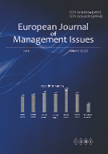Управление отходами в контексте перехода к циркулярной экономике: кейс Казахстана
Waste Management in the Context of Transition to a Circular Economy: the Case of Kazakhstan
Author(s): Olga Lygina, Marzhan Urazgaliyeva, Nursulu Kalaganova, Irina RykovaSubject(s): Energy and Environmental Studies, Economic development
Published by: Дніпропетровський національний університет імені Олеся Гончара
Keywords: circular economy; sustainable development; waste management system; municipal solid waste; regional aspects;
Summary/Abstract: Purpose: To rethink the concept of waste management in the context of the transition to a circular economy, to assess, establish the features and determine the directions of testing foreign experience in the field of waste management in Kazakhstan. Design/Method/Approach: The theoretical approach is based on a generalization of existing research, on the materials of content analysis of existing modern sources in the field of circular economy. Also, the study was carried out by selection, systematization of facts and data, abstraction, generalization to identify the problems of waste processing in Kazakhstan and search for their solutions. Findings: The waste management system is one of the conditions for the implementation of the "green economy", which is due to the insufficient degree of development of practical approaches to the topic of processing production and consumption waste. One of the driving factors contributing to the efficiency of the waste management system is the awareness and understanding of the theoretical and practical essence and goals of "green" categories, such as a circular model of production, processing technologies, financing instruments, etc. All this is aimed at solving problems associated with environmental pollution. The main factors hindering the development of the waste management system are mostly internal factors, including personal ones. Theoretical Implication: It has been substantiated that Kazakhstan needs a complete formation of a waste management system, taking into account the possibility of using world experience and improving the practice of the existing market for the sale of secondary resources. In addition, the issue of updating the activities of information companies to attract public attention to this problem was considered. Practical Implications: The results achieved can be used in various regions of Kazakhstan to attract the attention of local representative bodies, the public to the problem of waste management, which is one of the important components of the circular economy in the context of the development of a "green economy". Social Consequences: Achievement of certain results in the field of rational and effective waste management leads to minimization of their negative impact on the environment. Originality/Value: The originality of the article lies in the fact that it considers the problems of the weak functioning of the waste management system today in a more systematic way. Research Limitations/Future Research: Prospects for further research are related to the continuation of the analysis of the problems of forming a waste management system and the search for ways to solve them. Paper type: Theoretical
Journal: European Journal of Management Issues
- Issue Year: 29/2021
- Issue No: 2
- Page Range: 93-100
- Page Count: 8
- Language: Russian

